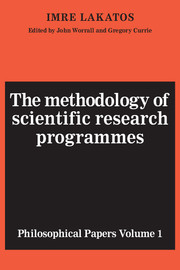Book contents
- Frontmatter
- Contents
- Editors' introduction
- Introduction: Science and pseudoscience
- 1 Falsification and the methodology of scientific research programmes
- 2 History of science and its rational reconstructions
- 3 Popper on demarcation and induction
- 4 Why did Copernicus's research programme supersede Ptolemy's?
- 5 Newton's effect on scientific standards
- References
- Lakatos bibliography
- Index of names
- Subject Index
4 - Why did Copernicus's research programme supersede Ptolemy's?
Published online by Cambridge University Press: 05 June 2012
- Frontmatter
- Contents
- Editors' introduction
- Introduction: Science and pseudoscience
- 1 Falsification and the methodology of scientific research programmes
- 2 History of science and its rational reconstructions
- 3 Popper on demarcation and induction
- 4 Why did Copernicus's research programme supersede Ptolemy's?
- 5 Newton's effect on scientific standards
- References
- Lakatos bibliography
- Index of names
- Subject Index
Summary
INTRODUCTION
I first should like to offer an apology for imposing a philosophical talk upon you on the occasion of the quincentenary of Copernicus's birth. My excuse is that a few years ago I suggested a specific method for using history of science as an arbiter of some authority when it comes to debates in philosophy of science and I thought that the Copernican revolution might in particular serve as an important test case between some contemporary philosophies of science.
I am afraid that first I have to explain – very roughly – what philosophical issues I have in mind and how historiographical criticism may help in deciding some of them.
The central problem in philosophy of science is the problem of normative appraisal of scientific theories; and, in particular, the problem of stating universal conditions under which a theory is scientific. This latter limiting case of the appraisal problem is known in philosophy as the demarcation problem and it was dramatized by the Vienna Circle and especially by Karl Popper who wanted to show that some allegedly scientific theories, like Marxism and Freudianism, are pseudoscientific and hence that they are no better than, say, astrology. The problem is not an unimportant one and much is still to be done towards its solution. To mention a minor example, the Velikovsky affair revealed that scientists cannot readily articulate standards which are understandable to the layman (or, as my friend Paul Feyerabend reminds me, to themselves), and in the light of which one can defend as rational the rejection of a theory which claims to constitute a revolutionary scientific achievement.
- Type
- Chapter
- Information
- The Methodology of Scientific Research ProgrammesPhilosophical Papers, pp. 168 - 192Publisher: Cambridge University PressPrint publication year: 1978
- 4
- Cited by



